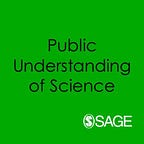Expertise in Crisis: the ideological contours of public scientific controversies
Review by Tom Douglass
[D]rawing on the study of expertise in science and technology studies, [the author] argues for broadening our understanding of expertise. Expertise is reconceived as a category that contains both scientific and non-scientific expertise; importantly, in doing so, expertise is separated from truth.
During the vaccination programme in England, Prime Minister Boris Johnson visited a vaccination centre in Northampton to promote COVID-19 vaccination. Speaking to journalists, he stated that it was time to challenge anti-vaccinationists whom he accused of disseminating ‘mumbo-jumbo’. Many people will agree with his assessment that the beliefs held by anti-vaccinationists are wrong and will be confused, even concerned, that some people cannot see the benefits of vaccination. In this ‘worldview’, consensus science is trusted; it has established the safety and efficacy of vaccines and anyone who does not hold this view is viewed as ‘misinformed’ or ‘scientifically illiterate’. In the worldview of anti-vaccinationists, meanwhile, people who trust consensus science are seen as unable to see the ‘truth’ or as ‘deceived by elites’.
How can we best communicate across this kind of polarising dispute to persuade others of the benefits of interventions like vaccination and achieve the outcomes desired by consensus science (in this case, high levels of vaccine coverage)? Science communication is a difficult enterprise, and we know that how information is received by an individual is shaped by socioeconomic position, disparate values, experiences and interests. Despite this, in relation to both the pharmaceutical and non-pharmaceutical interventions forming the pandemic policy response, science was frequently presented as unquestionable and completely certain (even at the same time as policy widely fluctuated).
The pandemic was also marked by tendencies to dismiss, attack, or even belittle the beliefs of people holding a non-consensus science worldview without really attempting to understand their views. Telling someone that they are ‘stupid’ or ‘misinformed’ is likely only to prompt a defensive, angry reaction or lead to the dismissal of the credibility of the messenger — not result in damascene conversion. In this short but highly valuable book, Caudill argues for an approach to the communication of science that prioritises modesty, humility, listening and understanding. Such an approach, which recognises in its communicative strategies the uncertainty of science (long established in the sociology of science and in science and technology studies) and the beliefs and values of those rejecting consensus science, Caudill argues, will help more effectively to build trust in consensus science.
To build this approach, it is necessary to establish why scientific expertise is in crisis — a task which the book deftly takes on. It is argued that the crisis is not simply the divide between the uninformed or those influenced by conspiracy theories on one side, and the scientific establishment on the other possessing truth. Rather the conflict is about belief in different experts, media sources, political parties and so on. Herein lies Caudill’s central contribution to this book: drawing on the study of expertise in science and technology studies, he argues for broadening our understanding of expertise. Expertise is reconceived as a category that contains both scientific and non-scientific expertise; importantly, in doing so, expertise is separated from truth. Caudill states that “a domain of expertise should be understood as simply an area of practice and language use shared by those in the domain, which can be as common as speaking English or playing tennis”. In this regard, you can be an expert in astrology as it is a shared practice with a shared language — though this expertise does not confirm the veracity of astrology.
Once we understand that expertise does not necessarily refer specifically to consensus science and truthfulness, Caudill establishes four different types of expertise present in the current divide: 1) the majority of scientists in a particular field who establish consensus; 2) the group of citizens who believe and trust consensus science; 3) the minority scientists who reject consensus and espouse alternative science; and 4) the group of citizens who distrust consensus science and accept minority scientific views. Drawing also on Wittgenstein’s philosophy and aspects of the anthropology of religion, Caudill establishes that every group of experts in the typology has a set of beliefs and these beliefs function as a worldview (hence my use of the term earlier). In this sense, “there is no neutral ground in the crisis of expertise, even though each side frequently claims (wrongly) that its side is not ideological, but the other side is”. The different types of expertise, rooted in their own ideological, faith-like beliefs, exist in a state of battle — and this is what people understand as the current crisis of expertise. Central, then, to the goal of building public understanding and trust in consensus science must be open acknowledgment of the ideological (almost religious) nature of all forms of expertise.
As the author acknowledges, overcoming the tribal and polarising nature of science beliefs will take time and persistence (and the pandemic has probably made things worse). Equally, Caudill argues strongly for civil, persuasive dialogue that centres the values and experiences of those across the divide, though there is more work to be done to establish the intricacies and technicalities of effective communicative strategies. As we saw during the pandemic in relation to issues like vaccination, anti-consensus science beliefs can be a matter of life and death. So, the task of building trust in consensus science is vital. If embraced, this is an endeavour in which Caudill’s insights regarding expertise could be highly valuable.
Tom Douglass is a Research Fellow at the University of Birmingham, England. Alongside his other health and adult social care research interests, he is currently working on a book concerned with the social and political nature of vaccines.
